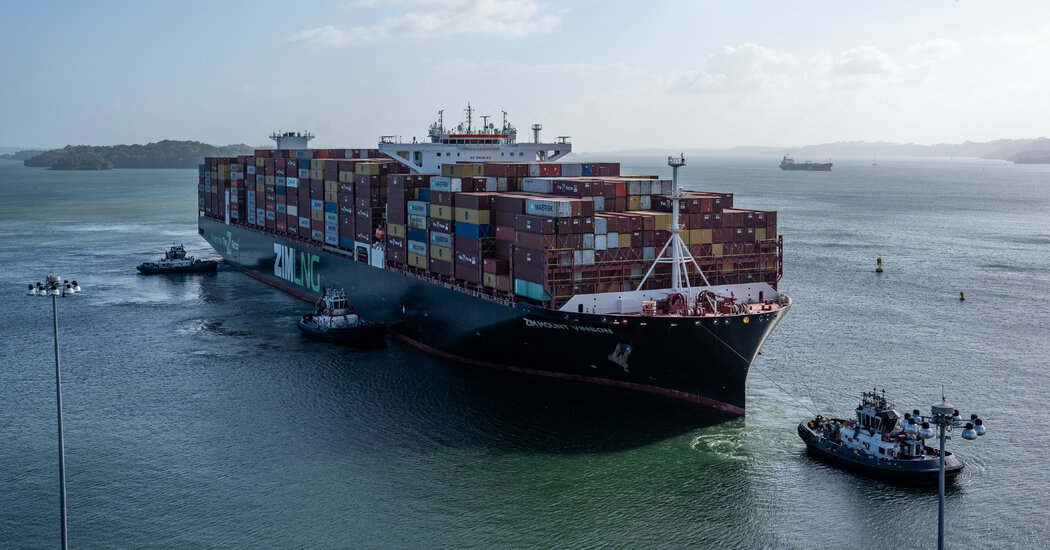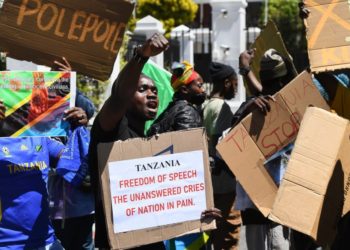More than 100 nations were poised last month to approve a historic deal to slash pollution from cargo ships. That’s when the United States launched a pressure campaign that officials around the world have called extraordinary, even by the standards of the Trump administration’s combativeness, according to nine diplomats on its receiving end.
An ambassador from Asia was told that, if he voted in favor of the plan, his country’s sailors would no longer be allowed to disembark at American ports. Caribbean diplomats were told that they could be blacklisted from entering the United States. And Marco Rubio, the secretary of state, personally called officials in several countries to threaten financial penalties and other punishments if they continued to support the agreement to cut ship pollution.
These and other threats, including tariffs, sanctions and the revocation of diplomats’ U.S. visas, effectively killed the deal, according to the nine American, European and developing-nation diplomats directly involved in the negotiations. They spoke on the condition of anonymity out of fear of retribution from the Trump administration.
The White House, the State Department and the Energy Department strongly denied that American officials made personal threats or intimidated diplomats. In statements and interviews, they acknowledged derailing the deal and repeated their opposition to international efforts to address climate change. They said the shipping fee would have hurt the American economy.
A State Department senior official also noted that the U.S. worked with Saudi Arabia to defeat the shipping fee and that allowed other nations that had reservations about the agreement to vote against it.
But foreign diplomats said they were stunned by what they described as “nasty” and “very personal” threats made by State Department officials, which were mostly aimed at leaders from poorer or small countries that are economically dependent on the United States. Some of the delegations were summoned to the U.S. Embassy in London for these discussions, these people said.
Most countries had been ready to vote for the plan, which would have imposed a fee on heavily polluting vessels to push the industry to clean up. It was negotiated over several years by the International Maritime Organization, a United Nations agency that oversees shipping policy.
But the Trump administration was able to block the vote, the nine diplomats said, after numerous countries backed away in the face of the threats from the Americans.
David Goldwyn, a former American diplomat and U.S. Energy Department official during the Obama and Clinton administrations, said the Trump administration’s tactics were over the top. “This was not a matter of dire national security, this wasn’t a resolution on Al Qaeda,” Mr. Goldwyn said. “Talk about the disproportionate use of force. This is really using a cruise missile, you know, to redress a traffic violation.”
The Trump administration has made clear its opposition toward global climate policies that it believes harm fossil fuel interests. Promoting the sale of U.S.-produced oil, gas and coal is a top administration priority.
“It was like a bunch of gangsters coming into the neighborhood and smashing windows and threatening shop owners,” said Senator Sheldon Whitehouse, Democrat of Rhode Island, who was briefed on the events by negotiators who were directly involved. Mr. Whitehouse called the Trump administration’s strategy a “shock-and-awe thuggery approach.”
Details of the Trump administration’s actions, some of which were reported earlier by The Financial Times, come as world leaders meet in Belem, Brazil, for three weeks of United Nations climate negotiations.
For the first time in 30 years, the United States is not sending high level representatives to the annual U.N. climate talks, and may not dispatch any technical staff, either. President Trump is withdrawing the U.S. from the 2015 Paris agreement, the global pact among countries to rein in climate change. He has called global warming the “greatest con job ever perpetrated on the world” and said that the science was developed by “stupid people.”
Senior Trump officials said that the administration was upfront about its opposition to the shipping fee, and detailed the potential ramifications for nations that supported it, including visa restrictions, port fees on ships and sanctions “on officials sponsoring activist-driven climate policies that would burden American consumers.”
“President Trump was clear, the United States will not adhere to any bogus international climate agreement that is not in the best interest of the American people,” Taylor Rogers, a White House spokeswoman, said in a statement. She said it was the I.M.O., not the Trump administration, that pressured nations to accept a bad policy. Mr. Trump “will not allow the I.M.O. to bully our country into propping up their Green Energy Scam,” she said.
The State Department did not respond to a request for confirmation of Mr. Rubio’s calls to other nations, but said the accusations of bullying and intimidation were false.
The nine diplomats said the Americans directed the most forceful language toward smaller or less powerful nations. One European official who has been attending I.M.O. meetings for nearly two decades called the tactics “unprecedented” and said negotiators from Caribbean and Pacific nations were rattled by them.
The diplomats reported that Mr. Rubio personally contacted several small Caribbean and Latin American nations to promise retaliation unless they joined the United States in opposing the shipping fee.
Another European diplomat described a conversation with a negotiator from the Philippines whose country was warned that its sailors would be denied docking rights in American ports if the Philippines voted in favor of the pollution restrictions. A negotiator from Jamaica was told he would never be able to visit the United States again, according to the European diplomat and an American close to the negotiations.
Officials from the Philippines and Jamaica could not immediately be reached for comment.
The shipping fee was negotiated over decades. It was considered a major step toward a goal of eliminating greenhouse gas emissions from the shipping industry by about 2050. Shipping contributes about 3 percent of global greenhouse gas emissions, roughly on par with aviation. Three percent may seem small, but the shipping industry transports about 90 percent of global trade, and demand is expected to grow. Without action, shipping emissions could increase drastically by 2050, experts said.
Under the deal, large cargo ships would have paid a fee if their carbon dioxide emissions exceeded a certain level. The standard would get stricter over time, encouraging the industry to move away from oil-based shipping fuel to cleaner options. The leading shipping lobby supported it, as did Britain, Canada, the European Union, Japan, China and the United States, until Mr. Trump returned to office.
Chris Wright, the energy secretary, said he and other Trump administration officials were told the approval of the maritime fee was a foregone conclusion, and took it as a challenge. Early on, State Department officials recognized the shipping fee as a winnable battle that would excite Mr. Trump.
“We decided to lean in,” Mr. Wright said on Oct. 22 at a talk at the America First Policy Institute, a conservative think tank aligned with the Trump administration. Mr. Wright said he personally spoke with officials in about 20 countries, and “enlisted” Mr. Rubio and Howard Lutnick, the commerce secretary, to also make calls.
In August Mr. Rubio, Mr. Wright and Mr. Lutnick issued a statement outlining the administration’s opposition. It foreshadowed what was to come, saying that countries “should be on notice” that the U.S. would “not hesitate to retaliate” against those who disagreed with the administration.
Over the next two months, U.S. officials stepped up their efforts.
“Some of it was visible, some of it was invisible, but it was very clear that the U.S. was going to extreme lengths to get countries on their side,” said Christiaan De Beukelaer, a senior lecturer in culture and climate at the University of Melbourne, who was at the talks as an observer. “It was wild.”
Four European officials said their countries came under tremendous pressure during a trip U.S. officials made to Brussels in September. The 27 E.U. nations had already made a legally binding decision to support the shipping fee. At one meeting, according to a European diplomat, a U.S. representative asked a German official why his country was taking orders from Brussels, a comment that was interpreted as mocking the structure of the E.U., which is based in Brussels.
A week before the agreement was expected to pass, Mr. Rubio, Mr. Wright and Sean Duffy, the transportation secretary, ratcheted up the warnings, releasing a statement that promised all manner of visa restrictions, fees and penalties against any nation that supported what they called “this European-led neocolonial export of global climate regulations.”
Mr. Wright took credit for writing a message denouncing the maritime plan that Mr. Trump “edited three or four words of” before he posted it on social media the day before the vote.
The efforts yielded results. On Oct. 17, nations voted 57 to 49 to delay a decision by one year, a vote that effectively killed the deal for the foreseeable future.
“I will tell you that the ‘it’s going to happen’ crowd was very disappointed,” Mr. Wright recounted during his appearance at the America First Policy Institute.
Ben Dietderich, a spokesman for Mr. Wright, said the administration had blocked what he called “the world’s first global carbon tax” and that “it wasn’t a tough sell once countries realized they would not be opposing the climate alarmists alone. Higher prices for nearly all the world’s consumers benefits no one.”
In the past, the United States has swung its weight around on the global stage under both Democratic and Republican administrations. But experts said the use of personal intimidation, if true, is new and particular to Mr. Trump’s second term, and could also violate diplomatic conventions.
“Personally threatening diplomats with visa revocations has not been a standard approach by any means,” said Richard Fontaine, the chief executive of the Center for a New American Security, a conservative research organization.
Mr. Fontaine added that visa denials have been used to prevent speakers from attending the United Nations General Assembly, but, he said, “I have never heard of the U.S. government explicitly threatening to revoke the visas of diplomats whose governments vote the wrong way.”
After blocking the shipping agreement, Mr. Rubio, in an editorial in The Wall Street Journal, praised the administration’s “coalition-building efforts.” He also issued a warning: “Should this initiative or any other similar one emerge from the U.N. bureaucracy again, our coalition against it will be ready — and larger.”
Lisa Friedman is a Times reporter who writes about how governments are addressing climate change and the effects of those policies on communities.
Max Bearak is a Times reporter who writes about global energy and climate policies and new approaches to reducing greenhouse gas emissions.
Jeanna Smialek is the Brussels bureau chief for The Times.
The post Trump Officials Accused of Bullying Tactics to Kill a Climate Measure appeared first on New York Times.




